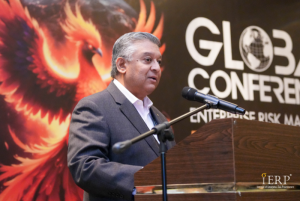The novel coronavirus is one in a long line of diseases to afflict the world’s population but Covid-19 is different. It has been affecting people in a different way. Indeed, the pandemic has underscored the material value of the health and contribution of people to business. It has become imperative that human capital value must be protected, preserved and sustained, first and foremost. “Studies of many crises have shown that Covid-19 has had comparatively more impact on the population,” said Shai Ganu. “Organisations therefore need to protect their employees and build resilience, build flexibility and rethink governance.”
Ganu, the Managing Director and Global Practice Leader of insurance, human benefits and capital consultants Willis Tower Watson spoke at the recent IERP International Conference on the topic of Stakeholder Capitalism, Organisational Purpose, and Environment, Society & Governance (ESG). Stressing that Covid-19 was a human capital crisis, he said the pandemic had underscored the importance of aligning management systems with the interests of all stakeholders. It is critical for organisational leadership to recognise this and care for people and the risks associated with people, first. Human capital is more valuable than physical or financial capital.
The focus should be on the wellbeing of employees, customers and supply chain partners. To this end, work and rewards should be reimagined, taking into account agility, virtual working, automation and reskilling. Leadership should demonstrate practicality, compassion and transparency, and make work and culture safe and inclusive. Employees should be protected, and resilience built across physical, emotional, financial and social wellbeing. There will need to be a rethinking of governance and oversight of human capital metrics, emphasising health, safety and sustainability. “Covid-19 has debilitated the workforce,” stated Ganu. “People have been taken out of the equation.”
Companies are already starting to rethink ways of helping employees and taking action to protect, preserve, rejuvenate and sustain human capital. Within the context of the pandemic, this can be divided into three stages: managing through the crisis; restoring stability; and operating post-crisis. One positive aspect of the pandemic is that it is likely to encourage the improvement of human capital governance, he remarked. Boards and management are beginning to prioritise ESG issues; they are starting to see the purpose and profitability of the firm as not mutually exclusive.
“Purpose defines why a business exists in a market,” he said, “but profit is important for the business to continue its existence and serve the interests of all stakeholders.”
This makes the “Stakeholder vs Shareholder” issue a matter of balance, not a trade-off. The business environment has, in recent years, seen the rise of stakeholder capitalism over shareholder capitalism. This is not necessarily a bad thing, as it takes into account the interests of all stakeholders, not just shareholders. It recognises that purpose and profits are not at odds or mutually exclusive, although there can occasionally be tension between the two. There has been an increased emphasis on ESG; it is evolving, developing many standards, frameworks, rating firms and rankings. But Ganu cautioned that certain factors should be taken into account when determining how to apply ESG.
“ESG metrics should be material, quantifiable, auditable, transparent and not linked solely to indices and strategy,” he advised.
Some of these include Environmental issues connected to responsible use of natural resources, global warming, energy use and pollution; climate change risks, raw materials and water scarcity, pollution and waste; innovation, clean tech and renewables. Social issues cover how a company treats its workers; health & safety; community outreach; social impact reporting and labour policies. Ethics, policies, accounting practices, compliance and transparency could be considered under Governance, as would inclusion & diversity, pay equity & fairness, and engagement and wellbeing.
ESG really needs to be linked to corporate strategy, Ganu stressed, adding that where they are offered, incentives should be designed to drive good behaviour. Companies may choose to have standalone incentive plans in order to keep performance constant. The longer the performance is kept up, the more incentive is earned. As a result of this, companies may start seeing themselves as ecosystems that operate organically, and adopt different business models which may better suit their respective corporate cultures. They are likely to develop the ability to learn fast as well, and learn differently. This kind of attitude will spur employees to learn, upskill or reskill as often as required.
ESG metrics are increasingly popular; the trend looks set to continue. Ganu said that research undertaken by his firm has shown that nearly half of US companies and two-thirds of firms in the EU have at least one ESG metric in their incentive plans. ESG measures tend to be people- and customer-centric, and are incorporated as part of broader operational or strategic measures. So far, no institutional investors have incorporated ESG metrics into their incentive plans, but market watchers expect to see uptake in the next two years. All this underscores the fact that attitudes are changing about the way to do business.
The application of ESG metrics is not just about generating wealth; it is about measuring performance through returns to shareholders as well as how a company achieves its environmental, social and governance objectives. The role of the organisation is extending beyond just maximising profits, Ganu concluded. “It is no longer an “either-or” proposition,” he said. “It has become an “and” proposition. Organisations are expected to not have to pick either profits or purpose. They are supposed make profits and have purpose. There is an increasing emphasis on ESG, with more attention being paid to the use of incentives, and how to use KPIs to drive the right behaviour.”


























